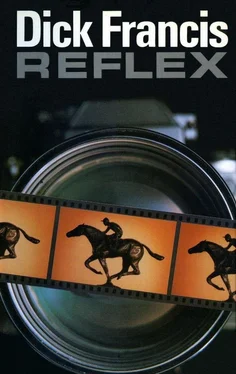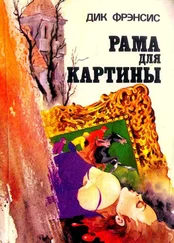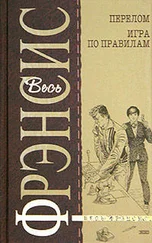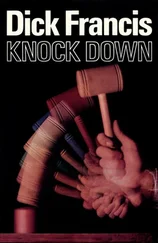Irritated, I put my clothes on and went downstairs, peering in at Steve on the way and finding him sound asleep.
Someone had perfunctorily swept the kitchen floor since the funeral-day burglary, pushing into a heap a lot of broken crockery and spilled groceries. The coffee and sugar had turned out the evening before to be down there in the dust, but there was milk along with the eggs in the refrigerator, and I drank some of that. Then, to pass the time, I wandered round the downstairs rooms, just looking.
The room which had been George Millace’s darkroom would have been far and away the most interesting, had there been anything there: but it was in there that the original burglary had been the most thorough. All that was left was a wide bench down one side, two large deep sinks down the other, and rows of empty shelves across the end. Countless grubby outlines and smudges on the walls showed where the loads of equipment had stood, and stains on the floor marked where he’d stored his chemicals.
He had, I knew, done a lot of his own colour developing and printing, which most professional photographers did not. The development of colour slides and negatives was difficult and exacting, and it was safer, for consistent results, to entrust the process to commercial large-scale labs. Duncan and Charlie had sent all their colour developing out: it was only the printing from negatives, much easier, which they had done themselves.
George Millace had been a craftsman of the first order. Pity about his unkind nature.
From the looks of things he had had two enlargers, one big and one smaller, enlargers being machines which held the negatives in what was basically a box up a stick, so that a bright light could shine through the negative onto a baseboard beneath.
The head of the enlarger, holding the light and the negative, could be wound up and down the stick. The higher one wound the head above the baseboard, the larger one saw the picture. The lower the head, the smaller the picture. An enlarger was in fact a projector, and the baseboard was the screen.
To take a print from a negative one wound the enlarger head up or down to get the size required, then sharpened the focus, then in darkness put a piece of photographic paper on the baseboard, then shone the light through the negative onto the photographic paper for a few seconds, then put the photographic paper through developer, fixer, washer and stabilizer, and hey presto, if one hadn’t stuck thumb marks all over it, one ended with a clear print, enlarged to the size one wanted.
Besides the enlargers, George would have had an electric box of tricks for regulating the length of exposures, and a mass of developing equipment, and a drier for drying the finished prints. He would have had dozens of sheets of various types of photographic paper in different sizes, and light-tight dispensers to store them in. He would have had rows of files holding all his past work in reference order, and safe-lights and measuring jugs and paper-trimmers and filters.
The whole lot, every scrap, had gone.
Like most serious photographers he had kept his unexposed films in the refrigerator. They too had gone, Steve had said, and were presumably at the root of the vandalism in the kitchen.
I went aimlessly into the sitting room and switched on the lights, wondering how soon I could decently wake Steve and say I was going. The half-tidied room looked cold and dreary, a miserable sight for poor Mrs Millace when she got home. From habit and from having nothing else to do I slowly carried on from where I’d stopped the night before, picking up broken scraps of vases and ornaments and retrieving reels of cotton and bits of sewing from under the chairs.
Half under the sofa itself lay a large black light-proof envelope, an unremarkable object in a photographer’s house. I looked inside, but all it seemed to contain was a piece of clear thickish plastic about eight inches square, straight cut on three sides but wavy along the fourth. More rubbish. I put it back in the envelope and threw it in the wastepaper basket.
George Millace’s rubbish box lay open and empty on the table. For no reason in particular, and certainly impelled by nothing more than photographic curiosity, I picked up the wastepaper basket and emptied it again on the carpet. Then I put all of George’s worst mistakes back in the box where he’d kept them, and returned the broken bits of glass and china to the waste basket.
Why, I wondered, looking at the spoiled prints and pieces of film, had George ever bothered to keep them. Photographers, like doctors, tended to be quick to bury their mistakes, and didn’t usually leave them hanging around in magazine racks as permanent mementoes of disasters. I had always been fond of puzzles. I thought it would be quite interesting to find out why such an expert as George should have found these particular things interesting.
Steve came downstairs in his pyjamas looking frail and hugging his injured arm, wanly contemplating the day.
‘Good Lord,’ he said. ‘You’ve tidied the lot.’
‘Might as well.’
‘Thanks, then.’ He saw the rubbish box on the table, with all its contents back inside. ‘He used to keep that lot in the freezer,’ he said. ‘Mum told me there was a terrible fuss one day when the freezer broke down and all the peas and stuff unfroze. Dad didn’t care a damn about the chickens and things and all the pies she’d made which had spoiled. All he went on and on about, she said, was that some ice-cream had melted all over his rubbish.’ Steve’s tired face lit into a remembering smile, ‘it must have been quite a scene. She thought it was terribly funny, and when she laughed he got crosser and crosser...’ He broke off, the smile dying, ‘I can’t believe he isn’t coming back.’
‘Did your father often keep things in the freezer?’
‘Oh sure. Of course. Masses of stuff. You know what photographers are like. Always having fits about colour dyes not being permanent. He was always raving on about his work deteriorating after twenty years. He said the only way to posterity was through the deep freeze, and even that wasn’t certain.’
‘Well...’ I said. ‘Did the burglars also empty the freezer?’
‘Good Lord.’ He looked startled, ‘I don’t know. I never thought of that. But why should they want his films?’
‘They stole the ones that were in the darkroom.’
‘But the policeman said that that was just spite. What they really wanted was the equipment, which they could sell.’
‘Um,’ I said. ‘Your father took a lot of pictures which people didn’t like.’
‘Yes, but only as a joke.’ He was defending George, the same as ever.
‘We might look in the freezer,’ I suggested.
‘Yes. All right. It’s out at the back, in a sort of shed.’
He picked a key out of the pocket of an apron hanging in the kitchen and led the way through the back door into a small covered yard, where there were dustbins and stacks of logs and a lot of parsley growing in a tub.
‘In there,’ Steve said, giving me the key and nodding to a green painted door set into a bordering wall; and I went in and found a huge chest freezer standing between a motor lawn mower and about six pairs of gum boots.
I lifted the lid. Inside, filling one end and nestling next to joints of lamb and boxes of beefburgers, was a stack of three large grey metal cash boxes, each one closely wrapped in transparent polythene sheeting. Taped to the top one was a terse message:
DO NOT STORE ICE CREAM NEAR THESE BOXES
I laughed.
Steve looked at the boxes and the message and said, ‘There you are. Mum said he went berserk when it all melted, but in the end nothing of his was really damaged. The food was all spoilt, but his best transparencies were O.K.. It was after that that he started storing them in these boxes.’
Читать дальше




